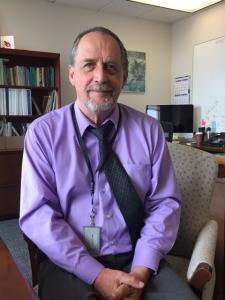Richard Merrick

Voices from the Science Centers
Voices from the Science Centers is an oral history initiative dedicated to documenting the institutional knowledge of fisheries scientists and administrators in the labs of NOAA’s Fisheries Science Centers.
Dr. Richard Merrick is Chief Science Administrator and Director of Scientific Programs at NOAA Fisheries. He has a B.S. and Master’s from Clemson University, two Master’s from Oregon State University in Marine Resource Management and Biological Oceanography, and finally a PhD in Fisheries from the University of Washington in Seattle. Merrick began his career with NOAA as a contractor in 1983, working in Alaska and the Arctic. He then moved to the Northeast Fisheries Science Center and continued working for the conservation of marine mammals. Later, he became Deputy Center Director, then Division Chief. He began his current position five years ago.
Interview contains discussions of: NOAA, NMFS, science policy, endangered species, protected resources, ecosystem-based fisheries management, climate change, climate science, ocean acidification, cooperative institutes, WHOI, OAR, satellites, underwater acoustics, noise pollution, copepods, cod, right whales, lobster, shellfish, Magnuson Act, Endangered Species Act, Marine Mammal Protection Act.
Merrick describes his current duties, which involve overseeing the six regional science centers, developing science policy, advising NOAA and government officials, and building relationships with other agencies. He discusses the history of NOAA and the changes he has seen during his decades-long career, and how the focus has shifted to climate change and ecosystem management. He details the importance of NOAA Cooperative Institutes, consortiums of universities that can easily collaborate with the science centers, and how he’s encouraging scientists to be better communicators outside the science community.
Merrick spends time discussing how new technologies like satellite imagery and more recently underwater acoustics have helped conservation science progress and how climate change and ocean acidification are driving the work NOAA does. He also elaborates on the tangible impact climate change is having on marine species like copepods and the cod that prey on them, and acidification is having on animals with calcium shells like lobsters and shellfish, and explains how communities that exclusively fish these species need to diversify.
Lastly, Merrick emphasizes the difficulties that arise when there’s disconnect between the states and the federal government, the regional offices and headquarters, science and management, or NOAA and Congress, and the importance of effective communication in addressing these issues. He also stresses the importance of partnerships in accomplishing projects.
Please Note: The oral histories in this collection are protected by copyright and have been created for educational, research and personal use as described by the Fair Use Doctrine in the U.S. Copyright law. Please reach out Voices@noaa.gov to let us know how these interviews are being used in your research, project, exhibit, etc. The Voices staff can help provide other useful resources related to your inquiry.
The NOAA mission is to understand and predict changes in climate, weather, oceans, and coasts, to share that knowledge and information with others, and to conserve and manage coastal and marine ecosystems and resources. The Voices Oral History Archives offers public access to a wide range of accounts, including historical materials that are products of their particular times, and may contain offensive language or negative stereotypes.
Voices Oral History Archives does not verify the accuracy of materials submitted to us. The opinions expressed in the interviews are those of the interviewee only. The interviews here have been made available to the public only after the interviewer has confirmed that they have obtained consent.
